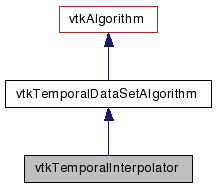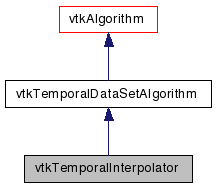vtkTemporalInterpolator Class Reference
#include <vtkTemporalInterpolator.h>


Detailed Description
interpolate datasets between time steps to produce a new datasetvtkTemporalInterpolator interpolates between two time steps to produce new data for an arbitrary T. vtkTemporalInterpolator has three modes of operation. The default mode is to produce a continuous range of time values as output, which enables a filter downstream to request any value of T within the range. The second mode of operation is enabled by setting DiscreteTimeStepInterval to a non zero value. When this mode is activated, the filter will report a finite number of Time steps separated by deltaT between the original range of values. This mode is useful when a dataset of N time steps has one (or more) missing datasets for certain T values and you simply wish to smooth over the missing steps but otherwise use the original data. The third mode of operation is enabled by setting ResampleFactor to a non zero positive integer value. When this mode is activated, the filter will report a finite number of Time steps which contain the original steps, plus N new values between each original step 1/ResampleFactor time units apart. Note that if the input time steps are irregular, then using ResampleFactor will produce an irregular sequence of regular steps between each of the original irregular steps (clear enough, yes?).
Higher order interpolation schemes will require changes to the API as most calls assume only two timesteps are used.
- Thanks:
- Ken Martin (Kitware) and John Bidiscombe of CSCS - Swiss National Supercomputing Centre for creating and contributing this class. For related material, please refer to : John Biddiscombe, Berk Geveci, Ken Martin, Kenneth Moreland, David Thompson, "Time Dependent Processing in a Parallel Pipeline Architecture", IEEE Visualization 2007.
Definition at line 64 of file vtkTemporalInterpolator.h.
Member Typedef Documentation
Reimplemented from vtkTemporalDataSetAlgorithm.
Definition at line 68 of file vtkTemporalInterpolator.h.
Constructor & Destructor Documentation
| vtkTemporalInterpolator::vtkTemporalInterpolator | ( | ) | [protected] |
| vtkTemporalInterpolator::~vtkTemporalInterpolator | ( | ) | [protected] |
Member Function Documentation
| static vtkTemporalInterpolator* vtkTemporalInterpolator::New | ( | ) | [static] |
Create an object with Debug turned off, modified time initialized to zero, and reference counting on.
Reimplemented from vtkTemporalDataSetAlgorithm.
| virtual const char* vtkTemporalInterpolator::GetClassName | ( | ) | [virtual] |
Reimplemented from vtkTemporalDataSetAlgorithm.
| static int vtkTemporalInterpolator::IsTypeOf | ( | const char * | name | ) | [static] |
Return 1 if this class type is the same type of (or a subclass of) the named class. Returns 0 otherwise. This method works in combination with vtkTypeMacro found in vtkSetGet.h.
Reimplemented from vtkTemporalDataSetAlgorithm.
| virtual int vtkTemporalInterpolator::IsA | ( | const char * | name | ) | [virtual] |
Return 1 if this class is the same type of (or a subclass of) the named class. Returns 0 otherwise. This method works in combination with vtkTypeMacro found in vtkSetGet.h.
Reimplemented from vtkTemporalDataSetAlgorithm.
| static vtkTemporalInterpolator* vtkTemporalInterpolator::SafeDownCast | ( | vtkObject * | o | ) | [static] |
Reimplemented from vtkTemporalDataSetAlgorithm.
| void vtkTemporalInterpolator::PrintSelf | ( | ostream & | os, | |
| vtkIndent | indent | |||
| ) | [virtual] |
Methods invoked by print to print information about the object including superclasses. Typically not called by the user (use Print() instead) but used in the hierarchical print process to combine the output of several classes.
Reimplemented from vtkTemporalDataSetAlgorithm.
| virtual void vtkTemporalInterpolator::SetDiscreteTimeStepInterval | ( | double | ) | [virtual] |
If you require a discrete number of outputs steps, to be generated from an input source - for example, you required N steps separated by T, then set DiscreteTimeStepInterval to T and you will get TIME_RANGE/DiscreteTimeStepInterval steps This is a useful option to use if you have a dataset with one missing time step and wish to 'fill-in' the missing data with an interpolated value from the steps either side
| virtual double vtkTemporalInterpolator::GetDiscreteTimeStepInterval | ( | ) | [virtual] |
If you require a discrete number of outputs steps, to be generated from an input source - for example, you required N steps separated by T, then set DiscreteTimeStepInterval to T and you will get TIME_RANGE/DiscreteTimeStepInterval steps This is a useful option to use if you have a dataset with one missing time step and wish to 'fill-in' the missing data with an interpolated value from the steps either side
| virtual void vtkTemporalInterpolator::SetResampleFactor | ( | int | ) | [virtual] |
When ResampleFactor is a non zero positive integer, each pair of input time steps will be interpolated between with the number of steps specified. For example an input of 1,2,3,4,5 and a resample factor of 10, will produce steps 0f 1.0, 1.1, 1.2.....1.9, 2.0 etc NB. Irregular input steps will produce irregular output steps. Resample factor wuill only be used if DiscreteTimeStepInterval is zero otherwise the DiscreteTimeStepInterval takes precedence
| virtual int vtkTemporalInterpolator::GetResampleFactor | ( | ) | [virtual] |
When ResampleFactor is a non zero positive integer, each pair of input time steps will be interpolated between with the number of steps specified. For example an input of 1,2,3,4,5 and a resample factor of 10, will produce steps 0f 1.0, 1.1, 1.2.....1.9, 2.0 etc NB. Irregular input steps will produce irregular output steps. Resample factor wuill only be used if DiscreteTimeStepInterval is zero otherwise the DiscreteTimeStepInterval takes precedence
| virtual int vtkTemporalInterpolator::RequestUpdateExtent | ( | vtkInformation * | , | |
| vtkInformationVector ** | , | |||
| vtkInformationVector * | ||||
| ) | [protected, virtual] |
This is called by the superclass. This is the method you should override.
Reimplemented from vtkTemporalDataSetAlgorithm.
| virtual int vtkTemporalInterpolator::RequestInformation | ( | vtkInformation * | , | |
| vtkInformationVector ** | , | |||
| vtkInformationVector * | ||||
| ) | [protected, virtual] |
This is called by the superclass. This is the method you should override.
Reimplemented from vtkTemporalDataSetAlgorithm.
| virtual int vtkTemporalInterpolator::RequestData | ( | vtkInformation * | , | |
| vtkInformationVector ** | , | |||
| vtkInformationVector * | ||||
| ) | [protected, virtual] |
This is called by the superclass. This is the method you should override.
Reimplemented from vtkTemporalDataSetAlgorithm.
| vtkDataObject* vtkTemporalInterpolator::InterpolateDataObject | ( | vtkDataObject * | in1, | |
| vtkDataObject * | in2, | |||
| double | ratio | |||
| ) | [protected] |
General interpolation routine for any type on input data. This is called recursively when heirarchical/multiblock data is encountered
| virtual vtkDataSet* vtkTemporalInterpolator::InterpolateDataSet | ( | vtkDataSet * | in1, | |
| vtkDataSet * | in2, | |||
| double | ratio | |||
| ) | [protected, virtual] |
Root level interpolation for a concrete dataset object. Point/Cell data and points are interpolated. Needs improving if connectivity is to be handled
| virtual vtkDataArray* vtkTemporalInterpolator::InterpolateDataArray | ( | double | ratio, | |
| vtkDataArray ** | arrays, | |||
| vtkIdType | N | |||
| ) | [protected, virtual] |
Interpolate a single vtkDataArray. Called from the Interpolation routine on the points and pointdata/celldata
| virtual bool vtkTemporalInterpolator::VerifyArrays | ( | vtkDataArray ** | arrays, | |
| int | N | |||
| ) | [protected, virtual] |
Called just before interpolation of each dataset to ensure each data array has the same number of tuples/components etc
Member Data Documentation
double vtkTemporalInterpolator::DiscreteTimeStepInterval [protected] |
Definition at line 99 of file vtkTemporalInterpolator.h.
int vtkTemporalInterpolator::ResampleFactor [protected] |
Definition at line 100 of file vtkTemporalInterpolator.h.
double vtkTemporalInterpolator::Ratio [protected] |
Definition at line 152 of file vtkTemporalInterpolator.h.
double vtkTemporalInterpolator::DeltaT [protected] |
Definition at line 153 of file vtkTemporalInterpolator.h.
double vtkTemporalInterpolator::Tfrac [protected] |
Definition at line 154 of file vtkTemporalInterpolator.h.
The documentation for this class was generated from the following file:
- dox/Hybrid/vtkTemporalInterpolator.h
 1.5.6
1.5.6